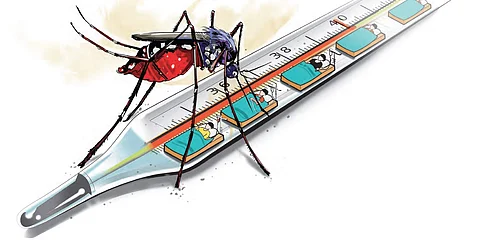

BHUBANESWAR: With dengue cases assuming alarming proportions, the State government has alerted the districts and urban local bodies to remain prepared and undertake vector control measures with immediate effect in the community to prevent further cases and deaths.
Alerting that the incidence of vector-borne diseases (VBDs) is likely to increase during monsoon and post-monsoon season due to the conducive environment, Director of Public Health Dr Niranjan Mishra has asked for mapping of vulnerable pockets by analysing the epidemiological trend of last five years with intensified surveillance in these areas.
From the past experiences, he said, malaria, dengue, Japanese Encephalitis and other VBD outbreaks can occur at any time giving rise to morbidity and mortality within a short period of time.“Collectors and Municipal Commissioners have been asked to take required effective control measures and keep the block and district level health teams in readiness for timely management of cases,” he said.
As many as 197 dengue cases have been detected in the season so far. While Malkangiri has recorded the maximum 57 cases, Khurda registered 55 cases. Koraput, Puri and Cuttack reported 37, 18 and two cases respectively.
The Public Health Director said though occasional spells of rainfall can result in the unprecedented rise of cases, most of the vector-borne diseases can be controlled if appropriate preventive measures are undertaken collectively at the district level. “We have alerted the districts to remain vigilant with all preparedness in terms of trained frontline workers, logistics, diagnostics and drugs. They will train and engage rapid response teams for prevention and control of vector-borne diseases,” he said.
The CDMOs have been instructed to ensure provision of tests, treatment and timely referral facilities to avoid deaths. They will have to plan for reaching out to inaccessible and difficult areas for regular monitoring of vector control measures for preventing and reducing disease burden.
Apart from intensive source reduction activities to be carried out to minimise the transmission risk of dengue, malaria and chikungunya, Dr Mishra said, the districts and ULBs have been directed to ensure the adequate availability of drugs, logistics, blood and blood products for management of cases.